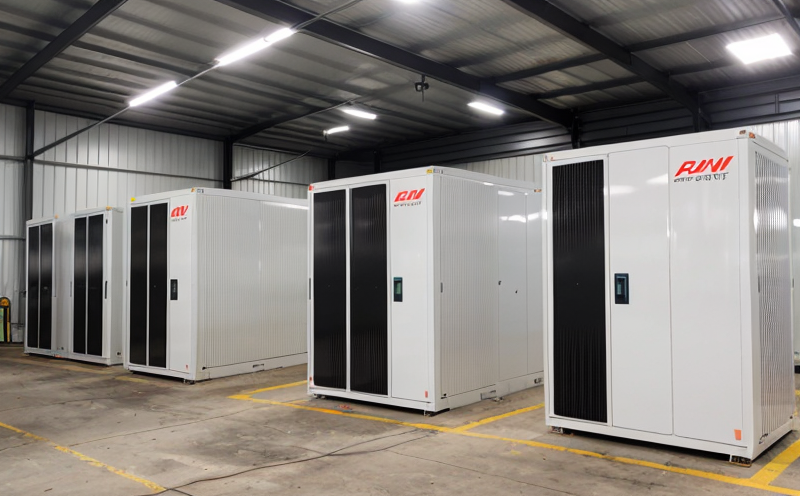ISO 6469-4 Protection Against External Short Circuit Testing
The ISO 6469-4 standard provides a framework for ensuring that electrical equipment and systems are protected against external short circuits. This is critical in the context of energy and renewable energy testing, particularly when dealing with battery and energy storage systems (BESS). These systems must be designed to withstand potential faults without compromising safety or performance.
The primary focus of ISO 6469-4 is on the protection mechanisms that ensure the integrity of electrical equipment during external short circuits. This includes the evaluation of protective devices such as fuses and circuit breakers, as well as the overall design and construction of the system to prevent damage or failure.
During testing, a controlled short-circuit condition is induced externally to simulate real-world scenarios that might occur in installations. The test aims at verifying whether the protection mechanisms operate correctly under these conditions without causing undue stress on the system components. This ensures compliance with international standards and enhances confidence in the reliability of energy storage systems.
The process involves rigorous preparation, including the selection of appropriate test equipment and the careful preparation of the specimen (the battery or BESS). The instrumentation used for this testing is precise to ensure accurate data collection and analysis. Once prepared, the system undergoes a series of tests that simulate various fault conditions. These include short-circuit durations, current levels, and temperature effects, all in accordance with ISO 6469-4 criteria.
The test results are meticulously documented and analyzed. Compliance with the standard ensures that the equipment can withstand external faults without failure or degradation. This is essential for safety and operational reliability in energy storage systems.
Benefits
- Enhanced Safety: Ensures compliance with international standards, reducing risks associated with external short circuits.
- Increased Reliability: Verifies that the system can operate safely under fault conditions without compromising performance.
- Improved Compliance: Demonstrates adherence to industry best practices and regulatory requirements.
- Increased Confidence: Provides stakeholders with assurance regarding the safety and reliability of energy storage systems.
The benefits extend beyond just compliance. By ensuring that all systems meet these stringent standards, manufacturers can enhance their reputation in the market and build trust among customers and regulators.
International Acceptance and Recognition
The ISO 6469-4 standard is widely recognized globally for its rigorous approach to protecting electrical equipment against external short circuits. Its acceptance ensures that testing performed adheres to international best practices, which can be beneficial in both domestic and international markets.
Many countries have adopted this standard as a benchmark for quality and safety in their national regulations. This recognition not only enhances the credibility of test results but also facilitates smoother trade between nations by ensuring mutual acceptance of standards.
The widespread use of ISO 6469-4 in various sectors, including energy and renewable energy, underscores its importance. By aligning with this standard, manufacturers can ensure that their products meet global expectations and are prepared for international markets.
Use Cases and Application Examples
| Use Case | Description |
|---|---|
| Battery Energy Storage System (BESS) Testing | Verification of BESS protection mechanisms against external short circuits. |
| Solar PV System Integration | Evaluation of protective devices to ensure safe integration into existing electrical systems. |
| Wind Energy Storage Systems | Testing for compliance with international standards in wind energy storage applications. |
| Hybrid Energy Solutions | Assurance that hybrid systems can withstand external faults without failure. |
| Grid Connected Applications | Evaluation of grid-connected systems to ensure they are protected against short circuits. |
- Battery Module Testing: Ensuring that individual battery modules can withstand external faults without degradation.
- Inverter Protection: Verification of inverters' ability to protect the system during fault conditions.
- Cable and Connector Integrity: Checking for integrity in critical components under short-circuit conditions.
These use cases highlight the versatility and importance of ISO 6469-4 protection testing across various energy storage applications. The tests are crucial not only for compliance but also for ensuring the safety and reliability of systems that play a vital role in renewable energy infrastructure.





